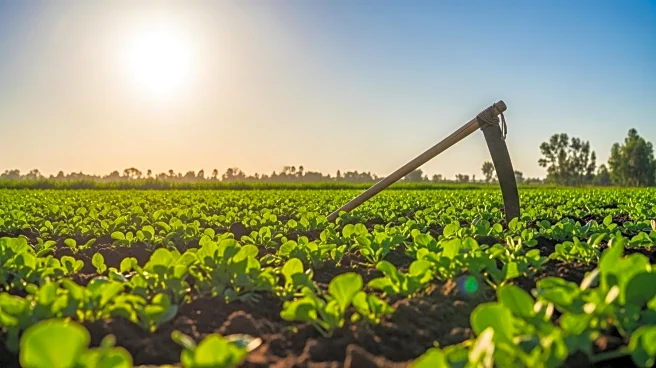What's Happening?
Ethiopia is progressing with its National Agroecology Strategy, aimed at transforming the country's food systems to be more sustainable, resilient, and equitable. The strategy, developed by the Ministry of Agriculture in collaboration with CIFOR-ICRAF and other partners, addresses challenges such as soil degradation, climate change, biodiversity loss, and nutrition security. A recent writeshop in Adama gathered 46 experts from various sectors to refine the strategy's objectives, focusing on sustainable farm practices, market development, and social inclusion.
Why It's Important?
The agroecology strategy is crucial for Ethiopia's efforts to enhance food security and environmental sustainability. By promoting agroecological practices, the strategy aims to improve interactions between plants, animals, humans, and the environment, fostering a more resilient agricultural system. This approach aligns with global demands for sustainable practices and climate resilience, potentially positioning Ethiopia as a leader in agroecological innovation. The strategy's success could influence international agricultural policies and encourage other nations to adopt similar frameworks.
What's Next?
The strategy outlines over 110 actionable activities across 26 strategic focus areas, with plans for implementation and financing. As the strategy is finalized, Ethiopia will likely seek to scale up agroecological practices nationwide, leveraging partnerships with research institutions and development organizations. The government may also integrate the strategy into national policies, promoting sustainable agriculture and climate resilience. Continued collaboration with international partners could enhance the strategy's impact and facilitate knowledge exchange.
Beyond the Headlines
Ethiopia's agroecology strategy represents a shift towards holistic agricultural practices that prioritize environmental and social well-being. By addressing systemic challenges, the strategy could lead to long-term improvements in food security and rural livelihoods. The initiative underscores the importance of collaborative efforts in tackling global issues like climate change and biodiversity loss, highlighting the role of agroecology in achieving sustainable development goals.









